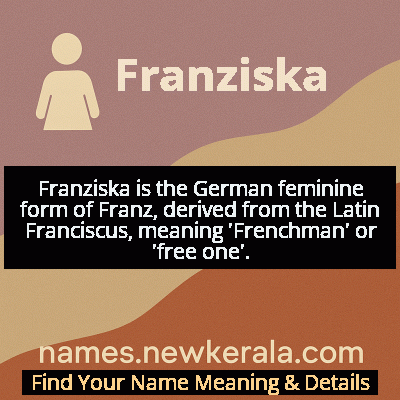Franziska Name Meaning & Details
Origin, Popularity, Numerology Analysis & Name Meaning of Franziska
Discover the origin, meaning, and cultural significance of the name FRANZISKA. Delve into its historical roots and explore the lasting impact it has had on communities and traditions.
Name
Franziska
Gender
Female
Origin
German
Lucky Number
6
Meaning of the Name - Franziska
Franziska is the German feminine form of Franz, derived from the Latin Franciscus, meaning 'Frenchman' or 'free one'.
Franziska - Complete Numerology Analysis
Your Numerology Number
Based on Pythagorean Numerology System
Ruling Planet
Venus
Positive Nature
Harmonious, responsible, caring, and artistic.
Negative Traits
Overly idealistic, superficial, possessive, or jealous.
Lucky Colours
Pink, turquoise.
Lucky Days
Friday.
Lucky Stones
Diamond, turquoise.
Harmony Numbers
2, 3, 9.
Best Suited Professions
Artists, musicians, teachers, healthcare workers.
What People Like About You
Warmth, nurturing nature, artistic flair.
Famous People Named Franziska
Franziska van Almsick
Swimmer
Won 10 Olympic medals and set multiple world records in swimming
Franziska Giffey
Politician
First female Governing Mayor of Berlin and former Federal Minister for Family Affairs
Franziska Knuppe
Model
Internationally recognized fashion model who appeared in Vogue and worked with top designers
Franziska Petri
Actress
Award-winning German actress known for both theater and film performances
Name Variations & International Equivalents
Click on blue names to explore their detailed meanings. Gray names with will be available soon.
Cultural & Historical Significance
In contemporary German culture, Franziska maintains its traditional appeal while adapting to modern values. The name is often associated with educated, independent women who value both their cultural heritage and personal freedom. This dual significance makes it particularly meaningful in post-war Germany, where traditional names have been reevaluated through modern lenses of gender equality and individual expression. The name's steady popularity across generations demonstrates its ability to evolve while maintaining cultural continuity, making it a symbol of how German identity has transformed while preserving historical roots.
Extended Personality Analysis
Women named Franziska are typically characterized by a compelling combination of strength and sensitivity, creating individuals who are both capable and compassionate. Their German cultural background often manifests in traits like reliability, discipline, and a strong sense of responsibility, making them natural leaders in both professional and personal contexts. Franziskas tend to approach life with methodical precision, carefully considering decisions while maintaining the flexibility to adapt when circumstances change. This balanced approach makes them excellent problem-solvers who can navigate complex situations with both logic and empathy.
Socially, Franziskas often display a warm yet reserved nature, preferring deep, meaningful connections over superficial relationships. They are typically loyal friends and devoted family members who value tradition while embracing progressive ideas. Their intellectual curiosity drives them to continuous learning and self-improvement, often making them knowledgeable in multiple areas. The name's meaning of 'free woman' frequently manifests in their strong sense of independence and self-reliance, though this is balanced by their respect for community and relationships. This combination of traits creates women who are both grounded and aspirational, practical and visionary - making Franziskas particularly effective in roles that require both emotional intelligence and strategic thinking.
Modern Usage & Popularity
In contemporary naming trends, Franziska maintains a respectable presence in German-speaking countries while remaining relatively uncommon internationally. The name experienced its peak popularity in Germany during the 1970s and 1980s but has since settled into a stable classic category rather than a trendy choice. Current usage patterns show that Franziska appeals particularly to educated, urban parents who value cultural heritage but seek names with strong, independent connotations for their daughters. The name's meaning 'free woman' resonates with modern parents interested in feminist values and female empowerment, while its traditional roots provide a sense of cultural continuity. According to German naming statistics, Franziska typically ranks between 150-200 in popularity, with stronger usage in southern Germany and Austria where traditional names remain particularly valued. The name's international recognition has increased slightly through globalization and media exposure, though it remains most common in German-speaking communities and among families with German heritage abroad.
Symbolic & Spiritual Meanings
Symbolically, Franziska represents a powerful convergence of freedom, cultural identity, and feminine strength. The name's core meaning of 'free woman' connects it to concepts of autonomy, self-determination, and liberation from constraints - both personal and societal. This makes it symbolically significant in contexts of female empowerment and gender equality. The name also carries strong European cultural symbolism, representing the rich intellectual and artistic traditions of German-speaking countries while maintaining connections to broader European heritage through its Latin roots. Franziska symbolizes the balance between individual expression and cultural belonging, making it meaningful for those who value both personal freedom and community ties. In metaphorical terms, the name suggests a bridge between tradition and progress, honoring historical roots while embracing contemporary values. This dual symbolism makes Franziska particularly resonant in modern multicultural contexts, where individuals often navigate multiple identities and seek ways to honor heritage while pursuing personal growth and independence.

